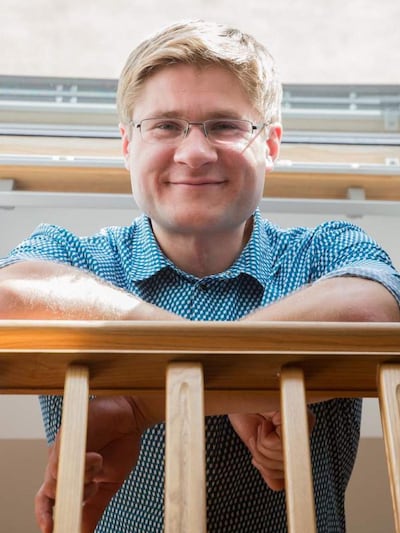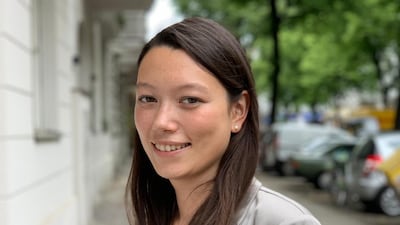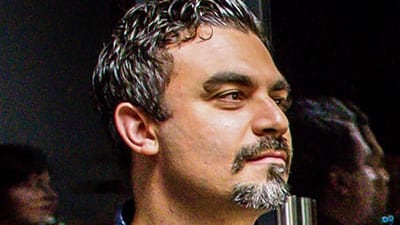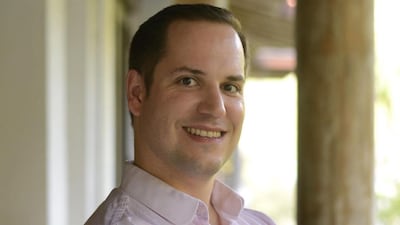More young professionals and start-ups are choosing Dubai as their home – with newly relaxed visa rules and a fast vaccine programme among the key drivers.
The National spoke to the founder of a German homeware brand, a British software company, and a Lithuanian travel agency, along with other digital remote workers who made the move.
Several visited during the height of Europe's winter lockdowns and have now decided to return.
“There were a lot of people who came here last autumn and stayed for several months because of the restrictions in their own countries," said Fred Roeder, managing director of London-based Consumer Choice Centre.
Fred Roeder, Consumer Choice Centre
“There was nowhere else to go that offered the same freedoms in Covid times.”
Now many of those visitors are making the move permanent.
"Dubai is experiencing a tectonic shift at the minute, with more and more highly skilled professionals starting to call it home," he said.
Mr Roeder, a respected health economist, produces a regular global resilience ranking of how well countries fared in the pandemic, which last week ranked the UAE second in the world.
It also recognised the Emirates for performing significantly better with its vaccination campaign than European Union countries.
The campaign, which delivers doses to people of all ages at the same time, means new arrivals can get the shots as soon as their visa residency documents are ready, which typically takes three or four weeks.
“Even though there is a lot of freedom you still see people sticking to the rules, you don't see as many people in other countries keeping their masks on," said Mr Roeder, a German who now too is based in Dubai.
The government's decision to grant resident visas for working remotely make it an even more desirable location, especially for younger people.
The most recent figures available, from Dubai Tourism in late March, show 1,700 people had applied for its remote working visa - the application link is here - with most accepted. For the first time, it allows people to live in the Emirates and work for a company abroad that has no base here.
In addition, 16,000 foreign travellers opted to take advantage of the city's free visa extension in January, Dubai Tourism's chief executive Issam Kazim told CNN Travel. Traditional visa routes working for domestic companies, self-employment and founding a start-up business are still popular.
German homeware founder finds a new home
Berlin resident Hanna Achilles-Auferoth, 34, plans to make the move to Dubai soon.
“I was there from February to April and now plan to move there permanently soon,” said the founder and chief executive of Achilles Berlin, a luxury lifestyle and homeware company.
“Dubai is an extremely attractive proposition for an e-commerce entrepreneur.
“When I was there I saw how easy it was to work remotely. I was impressed by how it was open for business meetings in restaurants, which was not something I could do in Germany.”
Ms Achilles-Auferoth already has one of the new remote work visas. The nature of her business means her employees do not need to be based in one location.
“We have a team of 10 but we all work remotely around the globe,” she said.
“It’s a very attractive prospect to be based in Dubai.”
Dubai's sunshine beats a Lithuanian winter
Edmundas Balcikonis relocated to Dubai in December to work temporarily while his home country, Lithuania, was under lockdown.
Mr Balcikonis, 34, runs a travel software firm called Eddy Travels, and despite the disruption caused by the pandemic, found his stint in Dubai was successful.
He plans to return to Lithuania soon to tie up loose ends before making the switch to Dubai permanent.
“Nothing was happening anywhere except in Dubai, so I decided to work from there instead of being in lockdown by myself at home,” he said.
“Being able to go to business meetings in person gave me great confidence in the market here.
“It made me decide to make the move to Dubai full-time.”

UK resident Edward Batrouni, 41, stayed in Dubai – working remotely – with his wife and two children, from December to April.
“We ended up staying longer than we first expected,” he said.
“My company has offices globally and Dubai is a perfect hub for me to operate from.”
He now plans to return and make it his family’s permanent home.
"I knew the UAE was at the forefront of innovation and were digitising as many processes as they could," said the founder of software company Zenitech.
“That made me want to be part of that growth and help shine a light on it.”















